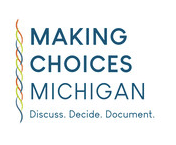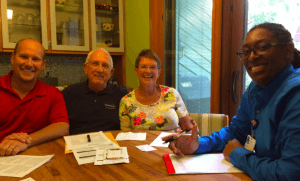National Healthcare Decisions Day, April 16, 2019


Have you had the conversation yet? According to a national survey, 92 percent of people feel it’s important to do so. And yet, only 32 percent of folks actually have had it. What conversation? Theone that focuses on decisions affecting your end-of-life healthcare.
Yes, that one.
“Once you have that conversation, it takes the burden off your family at a time when they already may be experiencing a tough time because of your medical condition,” notes Rob Huff, an attorney with the Grand Rapids-based law firm Varnum LLP. “In the process, you end up making important choices ahead of time, while also honoring a trusted person as your patient advocate.”
Huff has been practicing law only a few years, but it doesn’t take long to become savvy about the benefits of advance care planning. “There’s not a single drawback to having that conversation,” he points out. “The only drawback is in not having it.”
Planning one’s final wishes is so important that April 16 is known as “National Healthcare Decisions Day,” which exists to inspire, educate and empower the public about the importance of advance care planning. (Visit NHDD.org for more.)
“We’ve found that as people enter into hospice care, having those important end-of-life issues already in place allows family members the opportunity to worry about one less thing,” says Sara Lowe, executive director of Emmanuel Hospice.
Advance care measures – also known as a “living will” – provide direction to healthcare professionals when you’re no longer able to convey them yourself as the result of a coma, dementia, Alzheimer’s or other conditions. Having a plan in place – and designating an advocate ahead of time – ensures you get the care you want.
But as Huff emphasizes and Lowe agrees, it must begin with a conversation. According to the same survey cited above – conducted in 2018 by The Conversation Project – 21 percent of people say they shy away from talking about advance directives because they don’t want to upset loved ones.
And yet, 53 percent of respondents say they’d be relieved if loved ones started the conversation.
Residents of Michigan are especially fortunate to have in place a statewide registry where they can enter their medical wishes so that any of more than 4,100 hospitals and healthcare organizations can call up the information when end-of-life decisions are imminent. That organization – Great Lakes Health Connect (gl-hc.org) – works in concert with Making Choices Michigan, a long-time advocate for people seeking information about advance directives.
Katie Joseph, director of development for Emmanuel Hospice, says starting the conversation doesn’t demand a formal sit-down event.
“Some circumstances naturally open the door to a dialogue, such as a death in the family, a new diagnosis, a move, a divorce, job change or hospitalization.” Joseph says. “It’s much easier to make a plan in the midst of calm, not a storm.”
Huff and others who counsel people on advance planning understand their reluctance to make the first move: “It can be unpleasant for folks to think about their mortality,” Huff says. “It’s potentially a difficult conversation to have.
“The problem is that if you don’t, you will almost certainly create a much more difficult situation for your family and your loved ones at the time of trauma.
“If you end up having nothing in place, you may end up in court while mom is on life support. And that can be a distressing situation for everyone.”
If you’d like more information about creating an advance directive, you’re welcome to give us a call at 616.719.0919.
